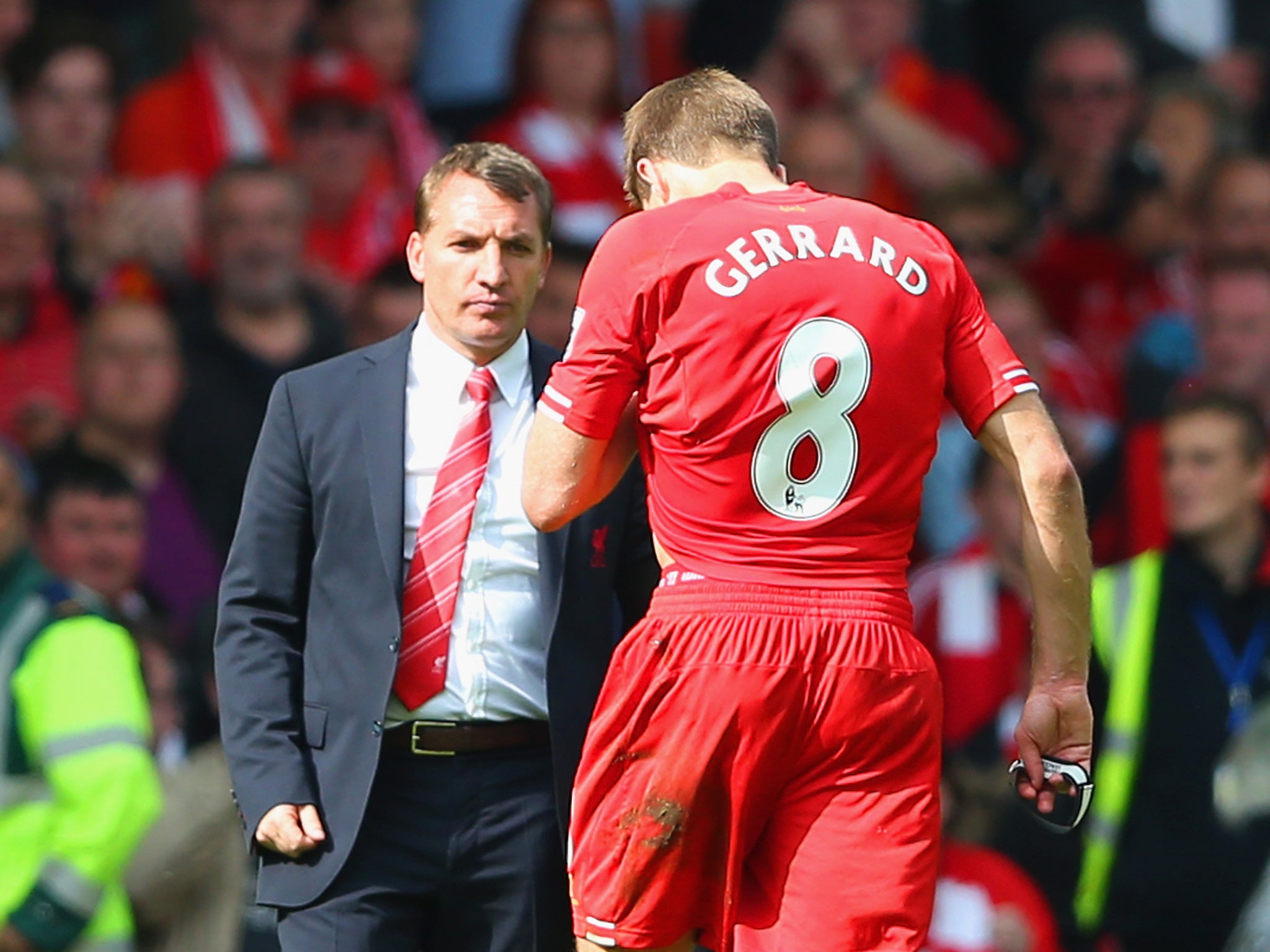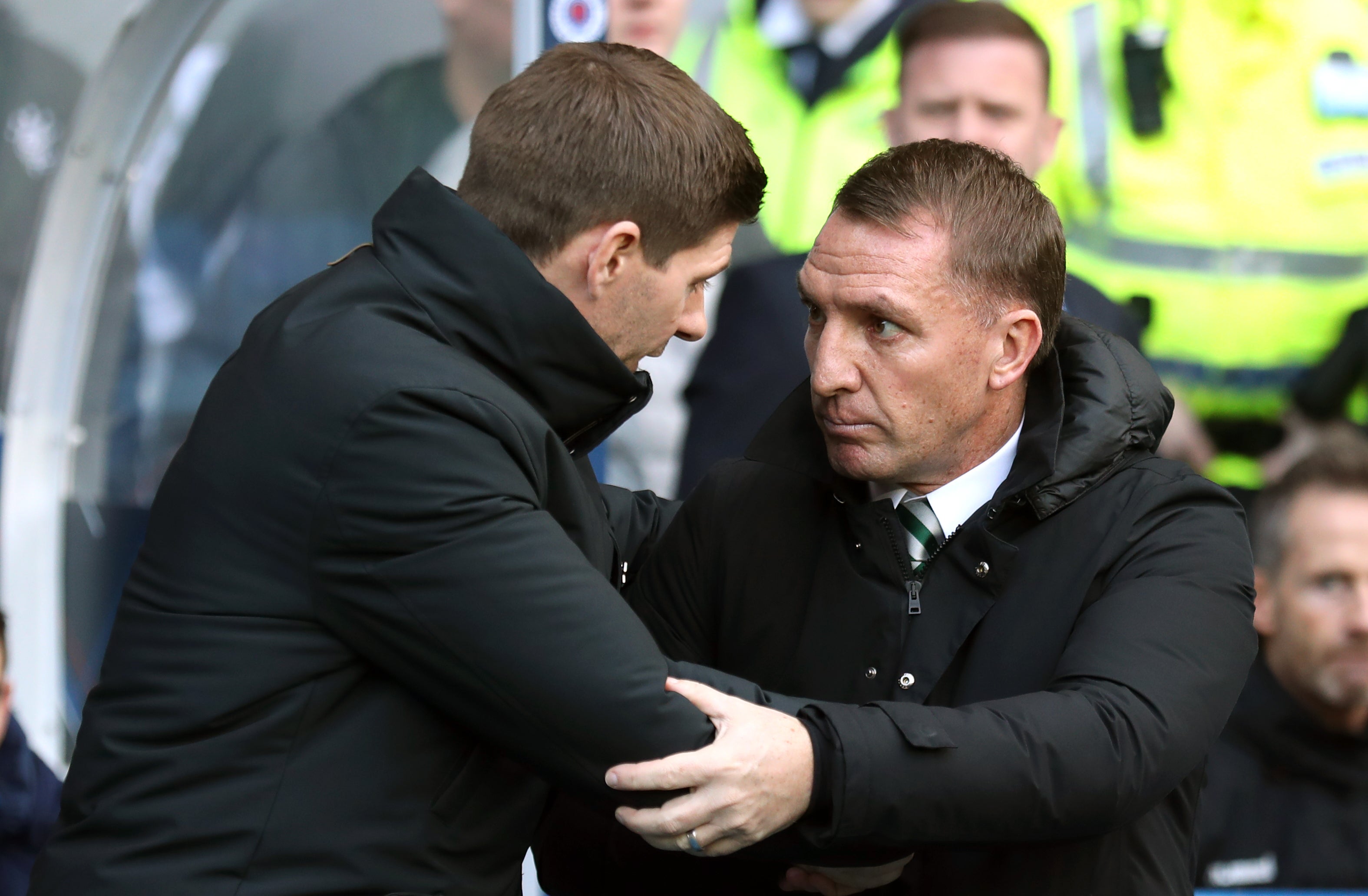Aston Villa face Leicester as frayed Gerrard-Rodgers relationship rekindled
The two managers hold great respect for one another but their time together at Liverpool was soured by a declining Gerrard’s frustrations with Rodgers

Your support helps us to tell the story
From reproductive rights to climate change to Big Tech, The Independent is on the ground when the story is developing. Whether it's investigating the financials of Elon Musk's pro-Trump PAC or producing our latest documentary, 'The A Word', which shines a light on the American women fighting for reproductive rights, we know how important it is to parse out the facts from the messaging.
At such a critical moment in US history, we need reporters on the ground. Your donation allows us to keep sending journalists to speak to both sides of the story.
The Independent is trusted by Americans across the entire political spectrum. And unlike many other quality news outlets, we choose not to lock Americans out of our reporting and analysis with paywalls. We believe quality journalism should be available to everyone, paid for by those who can afford it.
Your support makes all the difference.There is reflection in the media room at Kirkby, and while Steven Gerrard doesn’t blatantly spell it out, operating between the lines is the fact that he does regret some of his critiques of managers – one in particular punctuated by two big fixtures – that came from the vantage point of a player.
It is December 2017, and for the first time, he can see the game through both prisms having spent five months in charge of Liverpool’s Under-18s.
“I have a completely different perspective of football,” Gerrard would offer. “I have more respect for coaches and managers now as I didn’t realise how much was involved in their roles until I have tried it myself.”
On Sunday, he will host a tactician he learnt much from, but also openly skewered for making decisions he disagreed with: Brendan Rodgers. Their meetings in the Glasgow derby, while intense and important, escaped the wider themes that coat their relationship in a way that can’t be escaped in England.
There are two junctures that especially stand out in this story, both materialising in 2014. The first is a match neither will ever shake off, and the second was one that ultimately led to both their exits from Anfield: the slip and the surrender.
On 27 April, Liverpool were perched at the Premier League summit, five points clear with three games to go, until Jose Mourinho’s Chelsea refused to be the “clowns at the circus” and beat them 2-0 on Merseyside.
Their spoiling tactics – the Oscars of time-wasting – were assisted by Gerrard cruelly loosing his footing, which presented the ball to Demba Ba for a breakaway goal. A school of thought had emerged that Rodgers should have deviated from his offensive approach and, for one game only, countered the contain-obstruct-frustrate ploy with a patient, measured plan.
That was amplified to the extreme when Gerrard admitted as much in his 2016 autobiography: “I’ve never been able to say this in public before but I was seriously concerned that we thought we could blow Chelsea away. I sensed an over-confidence in Brendan’s team talks. We played into Chelsea’s hands. I feared it then and I know it now.”
Many of the backroom team at Liverpool bristled at the suggestion and Rodgers himself was annoyed at that take given the Real Madrid debacle that will soon be unpacked.
When Gerrard started working at the academy in Kirkby and spent time sponging off Jurgen Klopp, one person close to the Northern Irishman would ask if the ex-skipper dared ever think the German should change his high-pressing philosophy to accommodate an opponent.
Rodgers would loosely highlight this himself on the Robbie Fowler podcast this April. In breaking down the context of the situation, he said: “We were on an 11-game unbeaten run. We arrived into that Chelsea game in good form. We were an aggressive, attacking team, and we continued in the vein.
“Our team was very attacking, that was our strength, we didn’t have a defensive midfielder – that was our playmaker in Steven. We were very much a front-foot team.
“When you set up a team to play like Jurgen, offensive, aggressive, look to dominate – that would be like saying to him, ‘For this one game I just want you to stay away.’ It’s not going to happen.
“Your team is about pressing high, being dominant, being up there, but for this one game you’re going to do everything you haven’t done in the two previous years and you’re just going to sit back and invite pressure. You don’t play like Pep Guardiola or Jurgen Klopp on a Monday and then turn around and play like Diego Simeone on a Tuesday. It’s your identity.”

In November 2014, Liverpool were an altogether different equation, which amounted to not much without Luis Suarez, an injured Daniel Sturridge and a fading Gerrard.
Having been comfortably and rather effortlessly dispatched 3-0 by Real at Anfield, Rodgers opted for damage limitation at the Bernabeu.
Gerrard, Raheem Sterling, Jordan Henderson and Philippe Coutinho were on the bench as the starting XI gave off League Cup rather than Champions League vibes. Liverpool had been harder to break down, but were ultimately beaten 1-0 in a game that supporters still single out as a black mark against Rodgers.
There was no hint of over-confidence this time, rather every attempt to avoid an embarrassment. But it was being a substitute at Real that swung Gerrard’s mind to exit Anfield for LA Galaxy: “The night when my disappointment ran so deep I almost made up my mind that it was time for a change. How could I go on playing for Liverpool another year if these were the kind of empty nights that awaited me?”
Several people close to Gerrard have said his sentiments around these two matches, and many other situations viewed through the singular perspective of a player, have somewhat altered.
One of the initial things that hit him about being in charge of a team was how “it is a completely different game managing 25 players, 25 egos”.
But there is one element that Gerrard won’t veer from: being up front with his players. He felt the truth was sometimes sugar-coated by Rodgers, like in the build-up to being left out of the 11 against Manchester United in March 2015 when he was told he’d been training exceptionally.
While obvious tension developed in their relationship, furthered by being on contrasting ends of the Old Firm divide, there is ultimately respect and admiration between the pair.
Rodgers needed Gerrard the captain, who in turn needed his game to be adapted by a modern manager. They nearly delivered the holy grail together for Liverpool, but in flying so close to the sun, their partnership got singed around the edges.
“Brendan is a top coach,” Gerrard said in his pre-match briefing. “I think the biggest thing was his delivery on the training pitch. He is one of many managers who I watch closely and, in my position, when you are new and starting out and trying to gain that experience, then they are the type of people you try to learn from.”
There have been three distinct episodes in the Gerrard-Rodgers series: the initial freshness and fun of full-throttle football that nearly fetched the title, a fraying of the relationship with a breakdown in communication, and eventual parting before the touchline battle in Scotland.
Sunday marks the start of episode four: a past and present colliding in the Premier League that could yet be symbolic in Liverpool’s managerial future.
Join our commenting forum
Join thought-provoking conversations, follow other Independent readers and see their replies
Comments